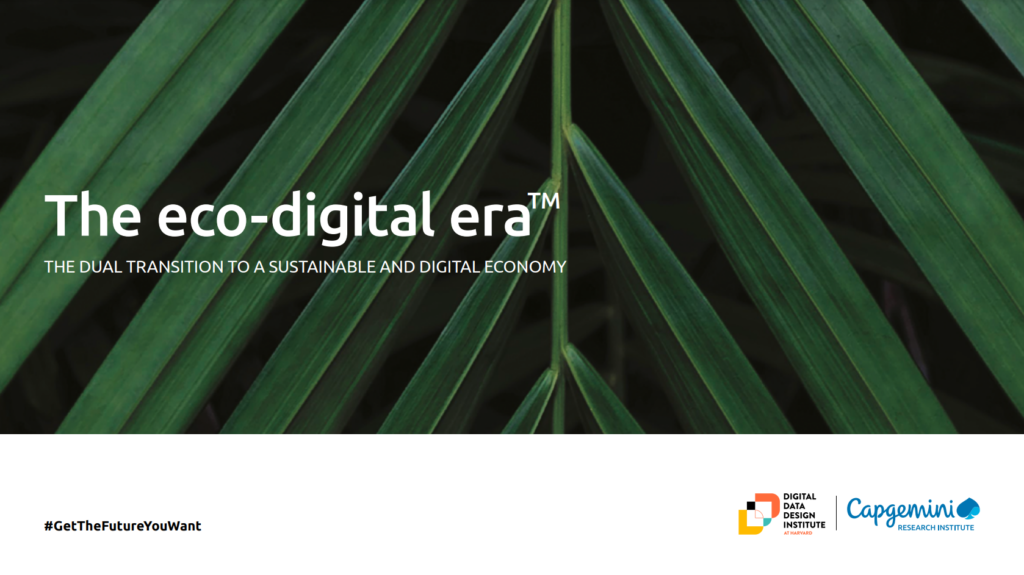Enter the Eco-Digital Era
30th January 2024

New research by Capgemini reveals that the eco-digital economy is expected to double in the next five years to almost $33 trillion (€30.5 trillion), but that the UK is lagging behind.
The untapped potential of digital technologies is vast, and the eco-digital economy, driven by digital and sustainability, is expected to double by 2028. That’s according to the Capgemini Research Institute’s latest report, ‘The Eco-Digital Era: The dual transition to a sustainable and digital economy’ developed in collaboration with the Digital Value Lab at the Digital Data and Design Institute at Harvard. Implementing digital technologies has enabled organisations to reduce their energy consumption by almost a quarter and delivered a 21% reduction in greenhouse gas (GHG) emissions in the past five years, cites the report.
In this new era of a dual transition to an eco-digital economy that delivers not only economic value, but also environmental and social value, the scaling up of digital adoption will propel economic growth with sustainability at its core.
More collaborative and platform-driven than ever before, this eco-digital era is giving rise to new business models and revenue streams, as well as enhanced cost efficiencies, all driven by data utilisation, cloud technology, collaborative ecosystems, and connected products and services. According to the report, seven in 10 organisations agree that digitally-driven business models will become a key contributor of revenue growth in the next three to five years. Furthermore, 60% expect digitally driven business models to generate more revenue than their traditional business models.
“In the eco-digital era, there is greater exploration of digital technologies’ value to business – for instance by the scaling of data and cloud, and by having digital technologies play a crucial role in achieving sustainability goals,” comments Dr. Suraj Srinivasan, Philip J. Stomberg, Professor of Business Administration at Harvard Business School and Head of the Digital Value Lab at the Digital Data and Design Institute at Harvard. “There is also a fast evolution of emerging tech such as generative AI and synthetic biology, and greater collaboration giving rise to digital ecosystems. This shift is truly fundamental, cross-sectoral and global in nature. One of the biggest questions that organisations have to address and manage, as they scale, is knowing what to centralise and what to decentralise in terms of platform architecture, and most importantly, data governance.”
UK Lagging Behind
While global organisations are prioritising investment into evolving technologies such as generative AI or edge computing, to decrease costs and increase efficiencies, the UK landscape paints a different picture for some of its technologies – one that is lagging behind the rest of society.
The UK findings suggest UK organisations shows similarities with the global average for GenAI and edge computing implementations (13% vs. 15%, 13% vs. 14%), but only 6% of organisations in the UK are currently implementing digital twin technologies (vs. 13% globally), and only 8% even have a roadmap to do so. Instead, as many as 43% say they are only currently thinking about it (vs. 25% globally).
The picture is similar with blockchain technology, with only 4% implementing this technology, and AR/VR/Metaverse technologies (5%) – again, the difference appearing to be that the UK is far more likely to be stuck in the ‘thinking about it’ stage. Given the worldwide focus on sustainability, the low implementation number for climate/clean tech is particularly concerning – with only 5% of UK organisations currently implementing such technologies (vs. 13%), and as many as 37% still in the planning stage.“
The eco-digital economy is unlike anything that has come before it, and society has harnessed only a fraction of the overarching potential that mainstream technologies such as cloud, AI, and automation hold,” said Fernando Alvarez, Chief Strategy and Development Officer at Capgemini and Group Executive Board member. “Organisations will need to leverage focused efficiencies in their core business, enabled by digital, in order to free up investment to support their dual transition. We are at the dawn of a new transformative era and we have only scratched the surface of how digital technologies can help expedite the delivery of substantial economic, environmental, and societal benefits.”

